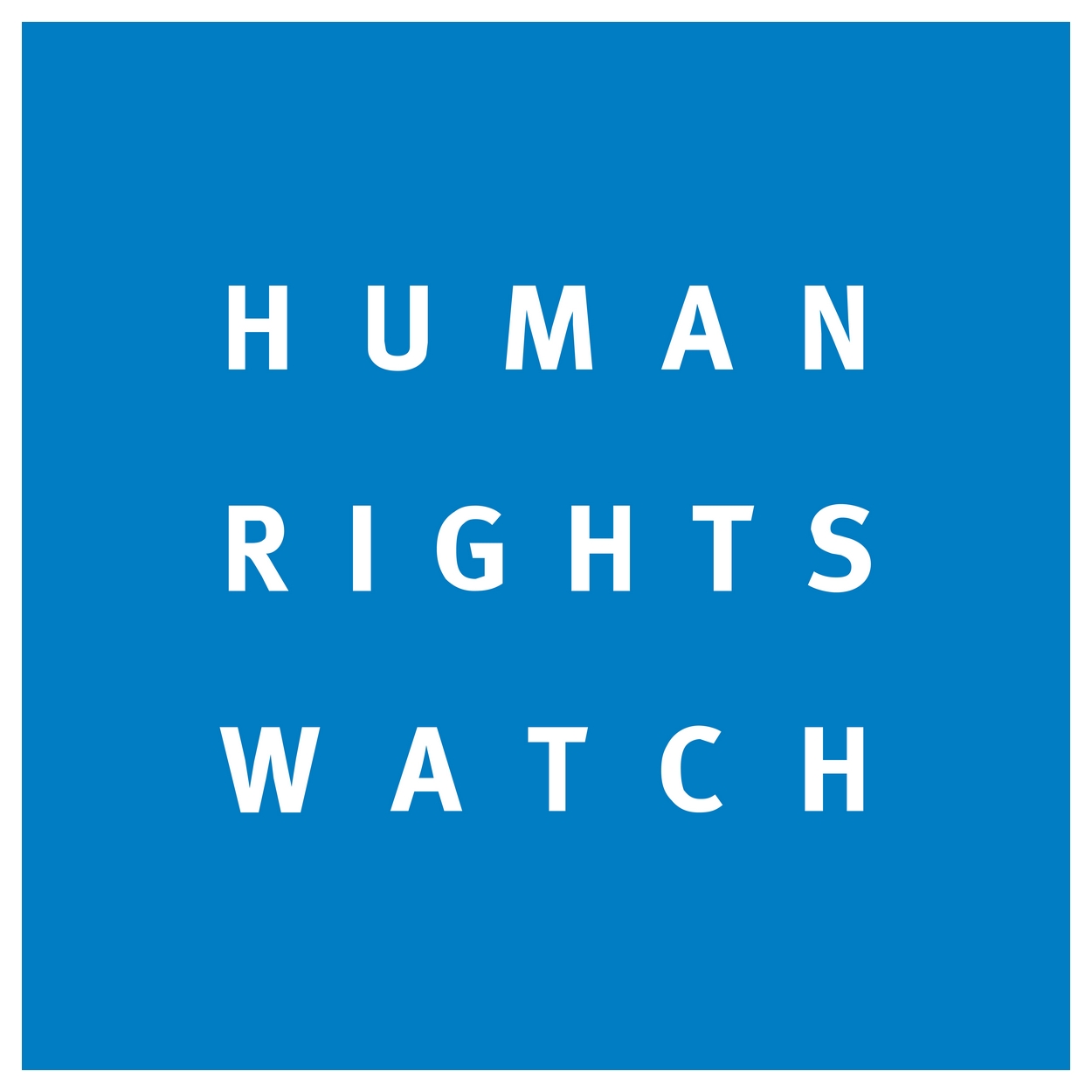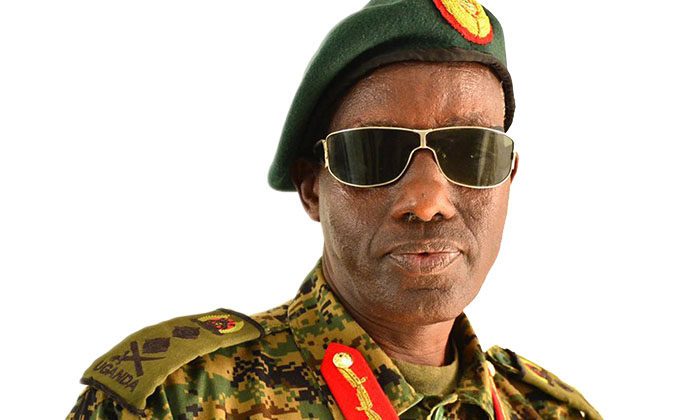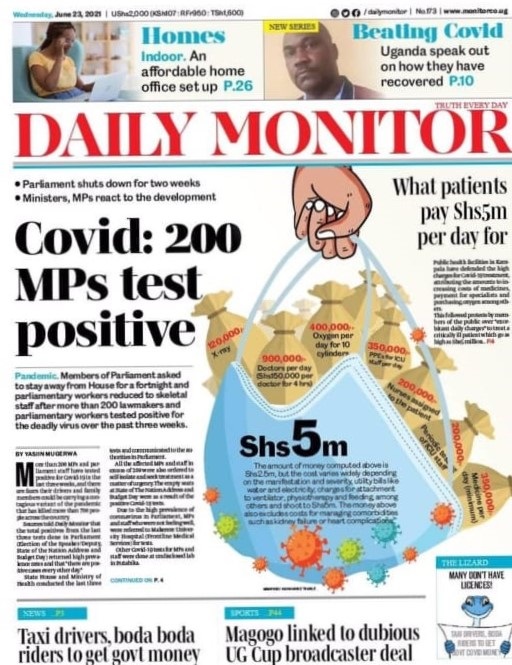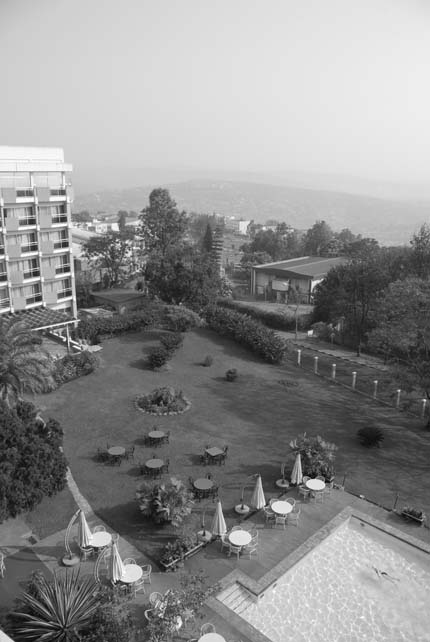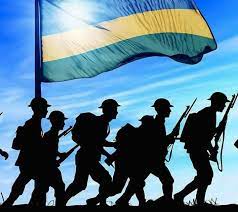Regional
Kagame, Tshisekedi firm in mission to end insecurity in region
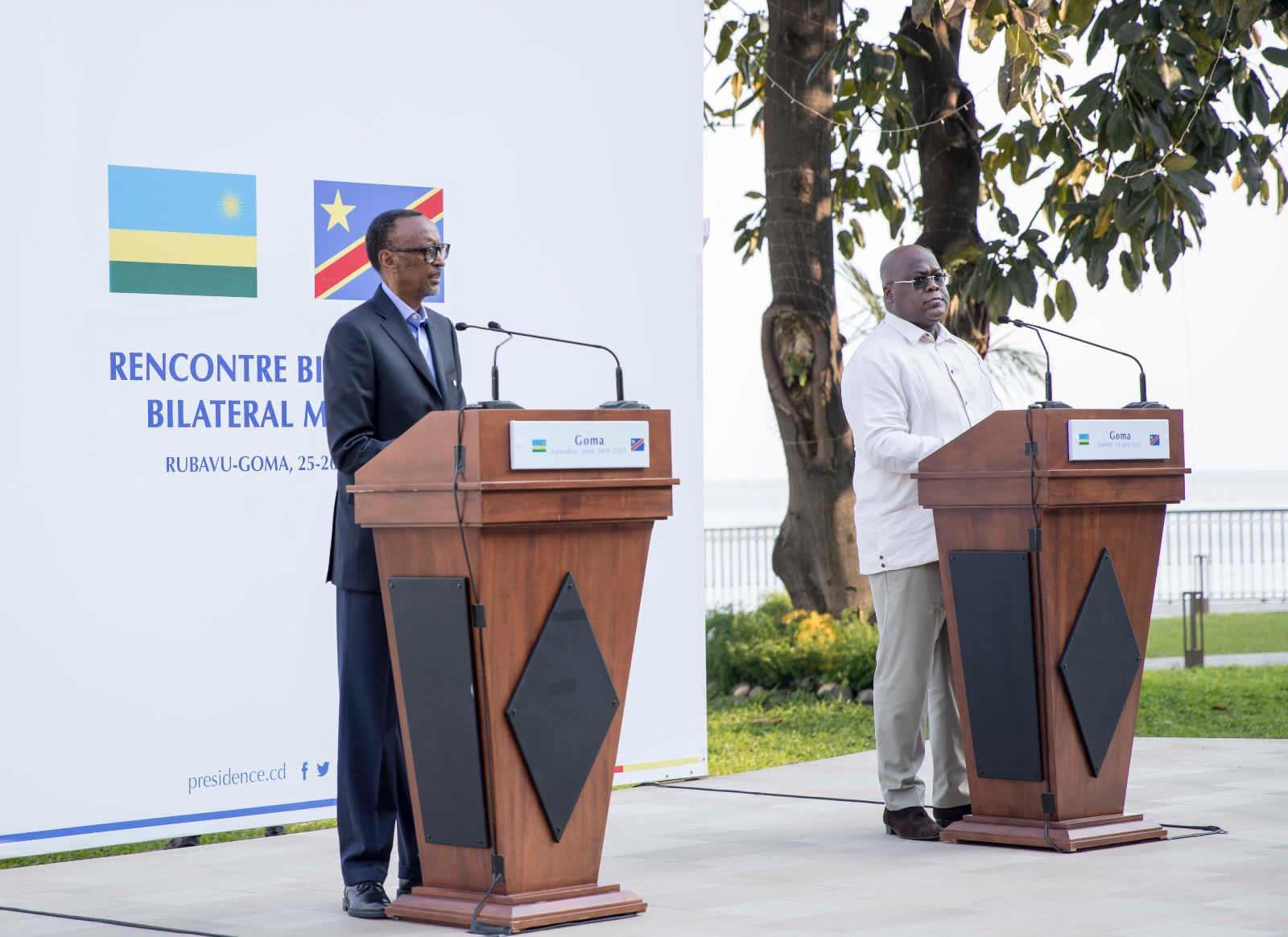
Presidents Paul Kagame and Félix Tshisekedi on Saturday, June 26, addressed a joint press conference in which they reiterated their will to cooperate to bring security and stability in the region, so that people in their respective countries enjoy peace, and development.
Presidents Paul Kagame of Rwanda and Félix Tshisekedi of the
Democratic Republic of Congo (DRC) on Saturday, June 26, reiterated their
unwavering will to cooperate in efforts to bring security and stability in
their region, so that people in their respective countries can enjoy peace, and
development. They stressed this while addressing members of the press in Goma,
capital of DRC's North Kivu Province, which borders Rwanda. They vowed to
continue to work together for the benefit of the peoples of the two countries,
and the region.
Day one. Presidents Paul Kagame of Rwanda and Félix Tshisekedi of the DRC on Friday, June 25, first toured Rubavu, in Rwanda, and assessed the damage caused by the recent earthquakes following the Mt. Nyiragongo volcanic eruption.
The joint press conference came after they concluded visits,
first to Rwanda on Friday and DRC on Saturday, where they toured the cities of
Rubavu and Goma and assessed the damage caused by earthquakes which followed
the Mt. Nyiragongo volcanic eruption on May 22. Calm has returned and,
recently, the Lake Kivu monitoring team in Rwanda concluded that there is no risk
of gas outburst expected in the Lake.
Presidents Paul
Kagame of Rwanda and Félix Tshisekedi of the DRC on Saturday, June 26 toured
Goma and assessed the damage caused by the recent earthquakes following the Mt.
Nyiragongo volcanic eruption.
The volcano eruption immediately caused panic in the city of
Goma, forcing thousands of residents to flee. At least 30 people reportedly
died when the volcano erupted and close to 400,000 were displaced. On Saturday,
the Presidents held their second, and final, tête-à-tête on the shores of Lake
Kivu, discussing matters of common interest.
They agreed to continue their mutual efforts to end
insecurity in the region and to create favorable conditions for the development
of investments, cross-border trade and economic cooperation between the two
countries with a view to consolidating peace and promoting shared prosperity.
They also discussed major challenges of the continent, particularly ongoing
efforts to fight the Covid-19 pandemic.
After an hour, they presided over a session where Ministers
from both countries put pen to paper on three key bilateral agreements - the
Bilateral Investment Treaty (on the promotion and protection of investments);
the Double Taxation Avoidance Agreement, as well as an MoU on a mining
concession - to further strengthen DRC-Rwanda diplomatic ties.
During the press conference, Tshisekedi recalled how, soon after Nyiragongo erupted, he got "a pleasant surprise" when he rang Kagame requesting that the Congolese citizens who fled to Rubavu be assisted and heard that instructions to the effect had already been given. "I give this anecdote just to demonstrate the fraternity that exists, and needs to continue existing, between our two countries and our two peoples," he said.
Tshisekedi reiterated that ever since he came to power in
the DRC, he maintains that "we've lost so many years" in endless
wars, tension and conflicts. "Now, that's enough," he noted, saying
that it is time to experience peace
as well as economic and brotherly collaboration between the two countries. To
him, the three bilateral agreements signed in the day were just one example of
how good things can be when neighbours work together.
"And this won't end here. It is just the beginning. For
me, I am happy," Tshisekedi said, explaining that he always wanted to
develop, together with neighbours. "My principal priority is to develop
fraternal relations with our neighbours because we have got more to gain by
sharing and thinking and looking in the same direction rather than in fighting
each other."
'State of
siege' in Ituri, North Kivu explained
About two months ago, Tshisekedi declared a “state of
siege”, or state of emergency, over escalating violence in the DRC's eastern
provinces of Ituri and North Kivu to swiftly end the insecurity which is
killing people in that part of the country. It came following a surge in
attacks by armed militia groups and intercommunal fighting in the mineral-rich
territory. At the time, Tshisekedi was preparing radical measures to deal with
the security situation in the east of the country caused by various Congolese
Mai-Mai groups and other terrorist militias from neighbouring Rwanda, Uganda
and Burundi.
Of more concern to Kigali is the Democratic Forces for the
Liberation of Rwanda (FDLR), a genocidal militia built from remnants of the
perpetrators of the 1994 Genocide in Rwanda, and its splinters and allies
including the National Council for Renewal and Democracy (CNRD-UBWIYUNGE)/National Liberation
Front(FLN) as well as the Rally for Unity and Democracy (RUD-Urunana). In
February, Kinshasa blamed the FDLR for the attack about 40 miles north of Goma
in which the Italian ambassador was killed.
On Saturday, a reporter sought clarity on the state of
emergency in eastern DRC. Tshisekedi explained that it sprouted from an
internal idea aimed at answering the question: why does violence continue
despite the means put in place, and the decisions taken?
Tshisekedi:
The violence must end
For decades, dozens of local and foreign armed groups have
operated in the North Kivu and Ituri provinces, with civilians being subjected
to horrifying massacres every year. Upon reflection, the Congolese leader said,
"we decided to implement the state of siege" which involved replacing
the civil administration in the two Provinces with a military administration.
And this is legal as per the country's Constitution, he said.
The Head of State needs real time awareness of what is going
on, Tshisekedi said, noting that it was not because he did not trust civilian
administrators. "It's got nothing
to do with that," Tshisekedi said, noting that the decisions he took would
be effective in helping manage a very complex phenomenon. Regarding actors
party to the violence, Tshisekedi noted that there were military elements,
local communities, incursions from neighbouring countries and certain
corporations working in the mining sector. All these, he indicated, created a
very complex phenomenon that calls for radical measures to ably deal with the
problem.
He said it requires rigorous control and very efficient
monitoring. Already, Tshisekedi added, the militarization of the administration
is bearing fruit. "Right now we
just need to accentuate the vigilance, and especially the control, so that it
yields results. It has nothing to do with the cooperation with Rwanda," he
noted, also reiterating that he has had a good understanding with Rwanda ever
since he came to power.
"We have the same objective, to attain peace. We have
the same obstacles to this peace. Therefore, it is necessary to combine our
effort to eradicate these obstacles and above all, to protect our populations.
That's the first preoccupation for me. The violence must be put to an
end."
Kagame: We
don't want to fail our people
Kagame, it looked clear, approved of the "sense of
urgency" that his counterpart put into solving a problem that has caused
havoc in eastern DRC for years. The Rwandan leader said: "Both of us,
President Tshisekedi and myself, agree that lack of security and peace and
instability cannot be things that are going to be permanent in both of our
countries. Neither should this be a situation that we get used to and live with
as a normal way of living our lives."
"So, something must be done. And it starts with what
the President decided and also what's going to be the follow on actions that I
am sure have already started, of actually dealing with the root cause of this
instability - dealing with (armed) groups that cause instability in this
region. And it's going to be much better if, therefore, all of us work
together."
Kagame, like Tshisekedi, stressed the importance of
cooperation for sustainable development. "We have the means. We have the knowledge
about our problems (and) we have the will to cooperate. I don't see how we can
fail, and we don't want to fail our people." The people of DRC or the
people of Rwanda, Kagame echoed his host, have waited for way too long "to
have some of these challenges addressed."
"We are up to the job, and we'll do our part."


